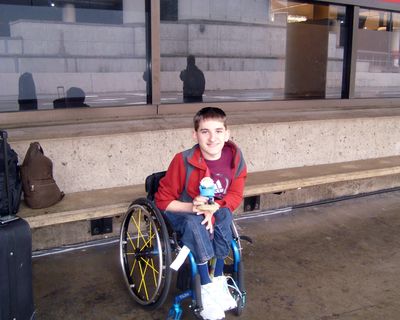DO-IT helps kids with disabilities develop to full potential

Seventeen-year-old Mead High School student Benjy Migliuri recently returned from a visit to the University of Washington. While it’s not unusual for high school seniors to tour prospective colleges, Migliuri’s 10-day stay was unique and one he’d never dreamed possible.
“I’m a quadriplegic from birth,” he said. “I’ve been in a wheelchair all my life.” His visit was made possible by the DO-IT (Disabilities, Opportunities, Internetworking, and Technology) Scholars Summer Study program. Funded by the state of Washington, the National Science Foundation, and the U.S. Department of Education, the program offers disabled students a glimpse of college life. DO-IT’s goal is to increase the success of individuals with disabilities in challenging academic programs and careers.
Migliuri had initially been reluctant to apply when his physical therapist told him about DO-IT. “My PT tried to get me interested in this a year ago, but this year I said I’d try it and I’m so glad I did!”
Sheryl Burgstahler founded the program in 1992. She said, “I saw a real need to help teens with disabilities transition into college and careers.”
Each summer, 16 to 18 students are accepted as DO-IT Scholars. So far more than 200 teens from across the state have participated in the program.
“We look for students with a broad range of disabilities who are college-capable and motivated,” Burgstahler said. Second-and third-year students are invited to return to continue preparing for academic programs and careers, while serving as mentors for first-year students. They also complete challenging projects during their stay on campus.
Burgstahler tells teens that the program is really hard to get into, but even harder to get out of. She laughed. “It’s unique in that the program attaches to the kids and provides ongoing support.”
Migliuri put it this way: “I made a lot of new friends.” DO-IT fosters and promotes those connections.
“Year-round, they communicate via the Internet with their new friends and are mentored by successful adults with disabilities,” said Burgstahler.
The high point for Migliuri was living on campus and getting to know his roommate. “We were given meal cards and had curfews. It was like we were going to college,” he said. “They kept us busy every single day. I was kind of happy to go to bed.”
The program encourages students to become aware of the challenges faced by people with disabilities that may differ from their own. “Learning about your own disability isn’t enough if you want to be a leader,” said Burgstahler.
For instance, when the DO-IT scholars visited Woodland Park Zoo and the Pacific Science Center, they were instructed to look for ways these places could better facilitate disabled guests.
In addition, the program fosters a sense of self-sufficiency. “We’re trying to achieve independence,” Burgstahler said. “We’re always asking, ‘How can you do that on your own?’ ”
That was an eye-opener for Migliuri. He said, “I learned that if you need something you have to ask for it – it’s not like high school or home.”
His taste of college life whetted his appetite for more. “My main goal is the University of Oklahoma. I want to be an air traffic controller,” Migliuri said. “I love airplanes and airports. I’d be a flight attendant or a pilot, if I could.”
Burgstahler said, “Ninety-five percent of our students make it to college. These students can be a lot more successful than most people think.”